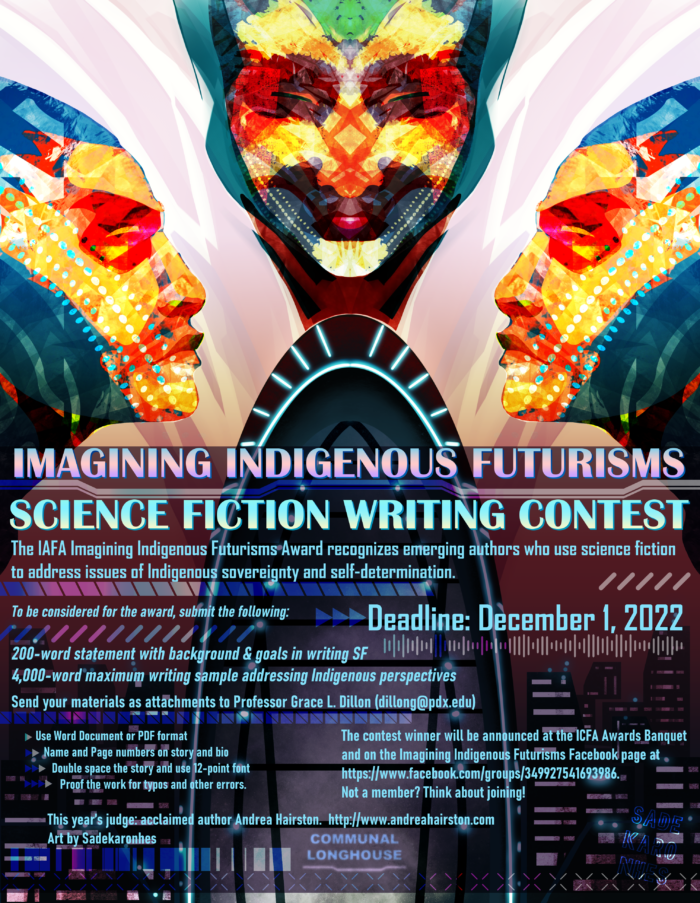IAFA Online Conference
October 7-9, 2022
“The Global Fantastic”
Deadline extended to July 31, 11:59 PM, EDT.
For a very long time, the fantastic and its spectrum of genres—science fiction, fantasy, horror, old and new weird, and others—has been perceived as very white and very English and French. The privileged circulation of texts by authors rooted in these two languages has been largely responsible for this condition, but the bias was also perpetuated by the international scholarship on these genres. Moreover, while the attention to Western authors and texts is definitely part of the problem, it can be argued that the very ways in which the conceptions of genres were originally formulated also contributed to the predominance of the Anglo-American (and, in some cases, Francophone) bias.
Things have changed, and, in 2022, attention has turned to the global fantastic that extends beyond a handful of former colonial centers. Several interrelated—albeit not necessarily mutually reinforcing—factors have been responsible for the new fantastic geography. First, the global spread of neoliberal capitalism, of which culture industries are an integral part, has seeded elements of Western imaginaries and transplanted models of production around the globe but also carved out opportunities for interaction with many local artists and creators. Second, the arrival and spread of digital technologies has dramatically expanded and democratized production and distribution of cultural texts, among which the broadly understood fantastic accounts for a sizable share. Most importantly, a range of political and cultural transformations going beyond storytelling has fostered a slow but steady realization that the category of the fantastic in general, and the genres of science fiction and fantasy in particular, can mean very different things in different places, and that a range of fantastic traditions has long flourished in many nations and regions around the world. This new lens reconfigures an understanding of not just the contemporary cultural landscape but allows for a discovery and recuperation of past traditions of the fantastic in the countries beyond the Anglo-French axis.
It is thus very apt that our inaugural October online conference, open to both regular ICFA attendees and those who cannot, for any reason, come to in-person events, should focus on the global fantastic to bring these traditions to the forefront.
The Guest of Honor is Tananarive Due, the winner of the American Book Award for The Living Blood (2001), the author of a dozen other speculative and mystery novels, and a film historian with expertise in Black horror. The Guest Scholar is Bodhisattva Chattopadhyay (University of Oslo), an internationally recognized scholar of global fantastic and the leader of the prestigious European Research Council grant “CoFutures: Pathways to Possible Presents.”
We invite paper proposals responding to, but not limited to, the following thematic areas and topics:
● Afrofuturism
● Africanfuturism
● Indigenous Futurisms
● non-Anglophone fantastic of the Global North
● local varieties of Western genres
● the fantastic produced in languages other than English
● slipstreams and interstitial genres
● non-Western genres of the fantastic
● postcolonial fantastic imaginaries
● non-Western media production in the fantastic: film, short film, television, video games
● theories of the fantastic beyond the Global North
Proposals not related to the conference theme are also welcome.
To submit a proposal, see https://forms.gle/souxbD9SjvN769cJ6. Deadline extended to July 31, 11:59 PM, EDT.
For a list of the IAFA Divisions and Division Heads, see https://iaftfita.wildapricot.org/Division-Heads.
For more information, visit our website https://iaftfita.wildapricot.org/.
Follow us on Twitter @IAFA_TW #IAFAGlobalFantastic
“Like” us on Facebook: https://www.facebook.com/FantasticArts/
 To be considered for the award, submit the following:
To be considered for the award, submit the following: